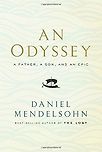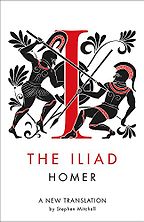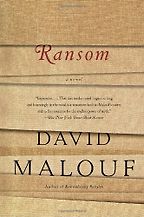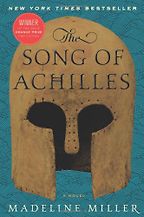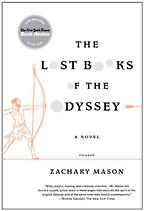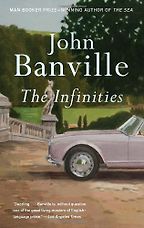To quote Italo Calvino, why read the classics? Why bother with them at all?
As I reach my dotage, the obvious response to that is that the classics are just good. You could equally well ask, why read Spanish literature? It’s a body of very interesting work that happens to be in Greek and Latin. Beyond that, because it is the primal literature of the West it gets you to the place where everything begins. It’s the source. It has led us to where we are now. Our kinds of plots, concerns, genres – all of them begin with the Greeks and the Romans. So anyone who has an interest in the history of literature in general would do well to study the classics.
Let me rephrase the question then. How are the classics relevant to our times? What insights into modern life and politics do they give?
I’m going to quote my dad here, who is a scientist and has spent the last few years reading the classics, for the first time in many cases. He put it brilliantly when he said: “As long as human nature doesn’t change, which it never will, the classics have something to tell us.” People aren’t different now, they just have better gadgets.
If you want to know about war, or about the manipulation of language in the service of political agendas, it’s all there. There is nothing that happened in 2003 AD that is substantively or qualitatively different from what happened in 431 BC. It’s only the details which have changed. Good literature always illuminates human nature and human action, and this is a literature that precedes everything else. So as long as people are the same, the classics are always relevant.
Given that, why are we updating them?
There’s the irresistible temptation to mess with an authoritative model. Whenever I write about adaptations of the classics – which I often do because I’m 1-800-dial-a-classicist – I often say that the Greeks themselves tampered with these stories. People have a hard time remembering that the myths which we associate with the Greek classics were, for the Greeks, infinitely elastic. There was no set version.
For example, we have an idea of what Oedipus Tyrannus is about, but in fact there were all kinds of different tragic treatments of it. In Euripides’s play The Phoenician Women, Oedipus and Jocasta are still ambling around the palace years after the discovery of their incest and Oedipus’s patricide. The idea that Jocasta has to hang herself out of shame is the Sophoclean version, but not the only version. So the Greeks were already playing with them, and that’s one of the reasons why I’m all for adaptation – it’s part of the classical heritage.
And when one does adapt, must one be wholly reverential or is part of the fun completely messing with the original?
I’m not a hard-ass defender of the pristine authenticity of the classics. Show me something interesting that uses the classics in a coherent and thoughtful way, even if it’s comic, and I’m all yours. There was a wonderful updating of Aeschylus’s play The Suppliant Maidens at the Brooklyn Academy 10 years ago in which the chorus of suppliant maidens appear on stage in wedding dresses. That is wacky but coherent in its own terms, and I thought it was terrific.
“We are all descendants of fate, and that quality of fated eventuality is part of what the gods represent in Greek literature”
On the other hand, if you’re just updating the classics because you want some fancy literary salad dressing for whatever mish mosh you’re preparing, you had better watch out. To take the classics seriously is one criterion that I would impose. That doesn’t mean you have to be serious, you could be funny, but there are also tawdry, embarrassing updatings that use classical window dressing for vulgar or unworthy tasks – like The Song of Achilles, which is one of my selections.
Let’s delve into more exciting adaptations before we get to the dregs. Please introduce Stephen Mitchell’s translation of The Iliad for those who may not have read your New Yorker article about it.
There are always new translations of The Iliad coming out, but this one has a very specific approach, both in terms of its philosophy of translation and its approach to the text. For a number of generations now, there has been an orthodoxy among classicists that the Homeric poems were orally composed and transmitted, and represent a series of adaptations, expansions and editings that took place during performance. Rejecting that idea is the eminent classicist Martin West, who thinks that there really was a Homeric figure – an original poet who accumulated a number of texts and wrote down what we would call a definitive text of The Iliad.
Which Stephen Mitchell attempts to find in his translation.
Right. What are suggestions in West become ossified in Mitchell into absolute statements. He tries to peel away the layers of the number of non-definitive versions to get to an original text. He cuts all of what is book 10 in the canonical version of The Iliad, which other people felt represents an excrescence in the Homeric tradition that doesn’t quite fit. So it’s a polemical text, and also a very strong, rhythmic, no-nonsense approach to the translation.
“People have a hard time remembering that the myths which we associate with the Greek classics were, for the Greeks, infinitely elastic. There was no set version”
Mitchell also gets rid of a typical element of the oral composition of the text – the epithets, or stock, repeated phrases like “swift-footed Achilles” or “red-haired Menelaus”. But when you peel that away, to my mind it’s problematic. The Iliad is what it is. It’s a certain moment in the development of what we call literature, and that archaic feeling is part of it. It even felt archaic when it was being performed in the 5th century BC.
Isn’t Mitchell’s point that “swift-footed Achilles” simply meant “Achilles” to listeners, so there was no descriptive function to the epithet?
That’s a point where I disagree with him. Homeric Greek, to the classic Greeks in Periclean Athens, had some of the feeling that the King James Bible does to contemporary anglophone audiences today. It’s English, we understand it, but it’s not the way we talk. Yet it’s authoritative within our own language. So much of the English we speak derives from its rhythms and figures of speech that it’s inseparable from contemporary language, although identifiable in a moment in the evolution of that language. Homeric Greek, in the same way, did not feel like ordinary Greek to Athenians who were chatting about the Peloponnesian war.
I have done translation myself, so I think about this a lot. To preserve that quality of archaic diction is tricky, but to strip away all the epithets leaves you with an Iliad that may be swift-footed, but doesn’t quite feel like the original does in Greek.
It does read very swiftly, though, and is compelling.
The famous problem of translating Homer is that the Greek has many qualities – all of them set out in a definitive essay by Matthew Arnold. One of those qualities is swiftness. In the original, The Iliad is both archaic and fast-moving. The English translator has to make a choice between replicating one or the other. So it’s a nice quality of Mitchell’s translation that it drives swiftly forwards, because that is something that is in Homer. But it’s unfortunate that one has to lose the other quality en route.
What’s your own take on the authorship of the Homeric poems?
I’m not a Homerite, so I don’t have a dog in this game, but I’ve always gone along with the oralists. To me, it doesn’t seem likely that there was one Homer. But I don’t think that these ideas are mutually exclusive. It seems clear that all this began as oral recitation – travelling bards picking up other people’s stories, and episodes gradually accreting over time. Then at a certain point someone – let’s call him X – may have thought it would be good to get all of this down, at the moment when writing became a useful tool in society. Or maybe it was many Xs. Obviously, whoever does the gathering is himself a person of great poetic sensibility, because as the reduction or editing takes place there are choices being made, lines included or omitted.
There are people who specialise in Homer whose lives are dedicated to figuring out these things. Martin West is a great and brilliant classicist, it’s not that I’m dismissing him out of town. But all you can say for certain is that it started out orally and at some point got written down – and that’s good enough for me.
Tell us about David Malouf’s book Ransom.
I’m a great admirer of Malouf, and I always feel that here in the States he is not significantly appreciated as a significant writer. He wrote a wonderful book called An Imaginary Life about Ovid in exile, which is a beautiful imagining of classical antiquity. And in Ransom he hit the jackpot. Like the ancient authors, looking to pry apart a space in the existing body of myths, he finds a moment in The Iliad to open up a bubble for this slight but very strong novel. It comes at the very end when Priam, the king of Troy, makes his passage in secret across the plain into the Greek camp, in order to bargain with Achilles to get the body of his son Hector back, whom Achilles has slain.
Malouf takes the episode of Priam’s trip to the Greek camp – which is dispensed with very briefly in Homer – and uses it to create his own novelisation of the archaic king becoming a different person. He does this by providing a wagon driver, Somax, who in Homer would be a royal herald accompanying the King but in the novel is a lower-class figure. Priam starts chatting to him, as people do when they take long trips together, and in these conversations Priam learns about real life in a way in which kings never get to do in archaic epics, because they only deal with other kings. By the end, Priam is transformed by Somax, who tells him how to make pancakes and other mundane, quotidian things. Priam learns that he doesn’t have to be the figure that he is in Homer, so to speak. I think that’s really terrific, and very moving.
“People aren’t different now, they just have better gadgets.”
The novel itself, like the best adaptations of the classics, is an occasion to reflect both on the genre and on genre in general. In Homer, the trick to ransom the body of Hector is instigated by Iris, the messenger of the gods. There’s a wonderful moment in the novel, when Iris doesn’t set it down as an absolute order – she approaches Priam and says, maybe you could do this but it’s up to you to innovate. Of course, the word “novel” itself means something that is new. So the novel is an occasion to look at something that is already there and make it new. It’s about climbing outside of the epic genre and seeing what other possibilities there are.
How else does Malouf play with the original?
One thing he plays with are fabulous details of stuff that you take for granted in Homer. In Homer the gods are always appearing to mortals, and Malouf, being a very good novelist, tries to imagine what that looks like. Let me find the actual line. He says there is an iridescent shimmer in the air and the gods “materialise, jelly-like, out of the radiant vacancy”. I think that’s fabulous – a very James Cameron effect as the gods materialise.
Is it not dated, and hard to reconcile when reading Homer today, that everything revolves around the gods and their agency in human action?
It’s hard for modern audiences in a way that was less difficult once upon a time. But if you look carefully at Homer, everything that happens is also a function of the personality of the characters. The gods are facilitators or enablers, but the seed of the actions is already present in the characters. I always ask my students: Does anything in The Odyssey happen that wouldn’t have happened if the gods hadn’t been present? Actually, with a few notable exceptions, no – apart from an occasional beauty makeover for Odysseus at crucial moments, that is. Odysseus makes things happen, because of the kind of person that he is. So I don’t think we should let ourselves off the hook so easily.
“I always ask my students: Does anything in The Odyssey happen that wouldn’t have happened if the gods hadn’t been present?”
The gods also represent the way things have to be – the element of chance, of accident. We still say that “things had to happen” a certain way. The gods are projections of that feeling, if you don’t want to think about them as gods, which is hard for us to do in a secular era. We are all descendants of fate, and that quality of fated eventuality is part of what the gods represent in Greek literature.
What can we learn about modern war by reading The Iliad?
The gadgets have changed but the large questions remain. As I get older, I increasingly think The Iliad is one of the first works to wrestle with the existential problem: If you’re going to die, what do you want the space between now and when you’re going to die look like? Does it matter? Does anyone care? On what value system do you base your actions? That’s what The Iliad is really about – a guy confronted by the possibility that the entire structure of his values is not being honoured. So why fight? And that is a question about war that never goes away, either as an individual or a nation.
Making love not war could serve as our segue to The Song of Achilles. I believe you were going to pillory this newly released novel.
This book by Madeline Miller extrapolates from The Iliad the ostensible love story between Achilles and [his comrade-in-arms] Patroclus. It is a novelisation of that, told in the first person by Patroclus – which among other things is difficult technically, because Patroclus dies in book 16 but the story goes beyond that. So at a certain point you’re wondering, as a reader, how this guy is talking. Another problem is that the book unbelievably trivialises the spirit of the original. I’ll never forget when, as an undergraduate, a professor whom I greatly admired told me after something silly I had said that “the classics is serious business”.
It’s not like you can’t write a book like this. The ancient Greeks thought there was something going on between Achilles and Patroclus – that it wasn’t just card games and beer drinking – so the kernel was already there for an erotic reading of the relationship. Aeschylus did it, Plato did it. But spare me the soft porn descriptions. I don’t want to know what Achilles did in bed, frankly. I don’t want to go there, as my students like to say. If you want to play with the big boys, fine, but don’t turn The Iliad into a Twilight novel. Mary Renault, a mentor of mine, said that descriptions of sex are the ketchup of literature – a really good dish doesn’t need ketchup. If I know who Achilles is, I don’t need to know what he did in bed.
Have you heard of the annual “bad sex in fiction” award by the British magazine Literary Review?
Yes I have, and I would definitely nominate this book.
As you mention, a lot of people have posited that the relationship between Achilles and Patroclus is homo-erotic. Others, such as Stephen Mitchell, say they are simply close friends. What do think?
Well, there is nothing in The Iliad to indicate otherwise. Achilles merely refers to Patroclus as his “best-beloved companion”. But we do know that in classical times it was more or less assumed that they had a typical homo-erotic relationship. In Plato’s Symposium, what they are debating is who was on top – not whether, but where. And a lost play of Aeschylus called The Myrmidons seemed clearly to treat it as an erotic relationship. So the classical poets read it that way. But Mitchell is correct, there’s nothing in the text itself that says as much. And I don’t care either way. It’s not going to change my life if Achilles is gay, unless he calls me up and asks me out for a date.
Closing on The Iliad, I have to ask what you thought of Brad Pitt as Achilles.
I’m always the first person in line on the day a new toga and sandals epic film is released. And some of them are great fun. To my mind, that movie suffered from a mistake that Aristotle identified in the Poetics. Instead of actually being a film version of The Iliad, which could work, it was about everything to do with the Trojan war, from the abduction of Helen to the fall of Troy, which is not in The Iliad. So it has an “everything but the kitchen sink” feel to it.
Five Books interviews are expensive to produce. If you're enjoying this interview, please support us by donating a small amount.
I don’t think Brad was terrible. I thought there were some good moments in the film, such as the initial assault on Troy and the encounter between Priam and Achilles near the end. So it’s not that it can’t be done, it just has to be done intelligently, and with enormous consultant fees to willing classicists.
One such classicist and friend of Five Books, Robin Lane Fox, led the cavalry change in Oliver Stone’s film Alexander, which he was a consultant on.
I know, it’s a famous thing. I want to put a footnote from now on at the bottom of every piece I write, saying that I’m available at a sizeable fee to consult before these people make the terrible mistakes that I later identify when I review their movies.
Tell us about your fourth pick.
Zachary Mason’s The Lost Books of the Odyssey picks up the notion that even within these ancient texts, the authors are envisioning possibilities for alternate universes of text. The premise is that there are other books of The Odyssey, aside from the canonical 24, which were lost – as so much classical literature is. This is the way in which he opens up a space to adapt it, and a lot of it is very ingenious.
In one of the episodes, someone comes to in a frozen landscape and gradually, by reading The Odyssey, realises that he is Odysseus and has forgotten who he is. That’s a very sophisticated play on a passage of The Odyssey itself, in which Odysseus claims to be “nobody” or “no man”, in order to protect himself and conceal his identity. So it’s a further imagining of something for which there is already a scene in Homer’s text.
What are some of the other imagined scenarios?
There’s one – which I don’t think very much of – where he comes back home to Ithaca, Penelope is not quite what he hoped, and he leaves. But that’s already in Tennyson and Dante, the idea that Odysseus doesn’t want to go home, he wants to keep travelling. There’s another very clever one where he envisions The Iliad as having begun as a chess manual. Some of it works, some of it doesn’t, but it’s all very Odyssean, because playing with the text is already in original. The Odyssey is about endless travel, and also about narrative and how you fill it up. Maybe that is why it keeps being adapted.
One famous rendering which we haven’t mentioned is James Joyce’s Ulysses.
Ulysses is the 800 pound gorilla in the room. It’s the one that naturally we all think of, and it’s the ultimate recasting of the classic – in a very self-conscious way.
Give us a couple of sentences on your own new book in progress.
It’s called Odysseys: Adventures in Reading the Greeks, and is a travel narrative interwoven with reflections on the meanings of the greatest hits of the classics – nothing abstruse or rare, all the ones people want to know about. It’s based on travels I’ve been making with my dad around sites associated with these different works, and the platonic exchange and discussion between me, a humanist, and my father, a scientist, about what we think the texts are about. We go to Troy, to Calypso’s cave, to the entrance to the underworld.
My god, where is the entrance to the underworld?
It’s near Naples, where so many underworld activities take place.
We’re not confusing this with bunga bunga parties?
I hope not.
Your final choice is John Banville’s The Infinities.
I quite like this book. It’s an adaptation of a play called Amphitryon, which is more famous as a Roman comedy by Plautus than in any other guise, although Molière and Heinrich von Kleist adapted it. And it’s also about the possibility of parallel texts. Banville takes the plot of this ancient play – about how Zeus seduces in disguise the wife of Amphitryon, a woman called Alcmene, and begets Heracles from her, his divine child – and updates this to the present. The hero is a famous mathemetician called Adam Godley (a significant name, obviously) who has come up with an equation to connect all the parallel worlds that could exist in the Einsteinian universe.
Get the weekly Five Books newsletter
At a certain point in the narrative, you then realise that although it looks like England we’re in one of those parallel worlds, the possibility for which physics has imagined. In this world, for example, Mary Queen of Scots triumphed over Elizabeth I and Scandinavia is a kind of Middle East. This becomes a clever way of suggesting that other versions are possible, while embodying the plot of the original play in the novel – there’s a beautiful daughter called Helen who is the object of the erotic attentions of Zeus himself, although she thinks it’s her husband, as it is in the play. It’s a lot of fun.
It also gives new meaning to the concept of the “god narrator”, as it is narrated by Hermes.
Yes, quite. So you have characters from Greek myth not only in the story, but narrating it. It’s very clever, and looking back on it I find it more successful than Zach Mason’s book, where the cleverness gets to be a little wearisome after a while. But in Banville it works, and shows that this thing can be done and ought to be done.
Are there any classics that you would particularly love to see updated?
I’m a great advocate for three plays by Euripides that to my mind are never sufficiently adapted. They are what we call Euripides’s romances – the Ion, the Iphigenia in Tauris and the Helen. These plays remind you almost of the Shakespearean romances. People are left on a desert island or a strange shore, their mates are far away trying to find them and are also eventually shipwrecked, there are misrecognitions and mistaken identities, and eventually it all comes together in a happy ending. I think that’s one of the reasons why people don’t like to put them on – because of their notions of what a Greek tragedy should be. They think it should end with lots of bodies on stage. But these are very psychologically subtle plays about identity. I would give an eye to see a beautiful production of them.
Do you think that modern fiction and literature is a patch on the classics, and is producing works that will last as long as Euripides has?
Nobody knows better than classicists to avoid that kind of question. I can’t sit here in my living room on the west side of Manhattan, opining about what’s going to last. Things that last last for all kinds of reasons, and only one of them is how good they are. Things survive by accident that don’t get eaten by rats, or by computer viruses that haven’t even been invented yet because the computers they will eat haven’t been invented yet. So there’s no guarantee. Sappho composed poems that were collected in nine volumes in the Alexandrian library, of which we have exactly one complete poem left. I bet there were some good poems among the other eight volumes too.
Get the weekly Five Books newsletter
So quality isn’t a guarantee, and that’s a lesson worth remembering if you’re a writer as well as a critic. If you sat there and made a list of the hundred greatest novels today – as people love to do – and people looked at that list a thousand years from now, they would be laughing their heads off.
So is it history itself – the fact that these texts have survived, for whatever reason – that confers status on them?
Yes, absolutely. They have value because they’re there. The process of canon formation itself is fascinating – we project a certain value onto what survives that maybe it shouldn’t have. In ancient times already, each of the three major tragedians had a school text of seven plays. But another bunch of plays by Euripides just happened to survive on a manuscript. And some of them are not so great, according to the strict notions that we have about what makes a good tragedy. So there’s no way to say what’s good, what’s not good, why it survived, and whether it survived because it’s good. There’s a lot of classical dreck out there. But we’re happy we have it, because we’re interested in the culture.
Interview by Alec Ash
April 4, 2012. Updated: March 22, 2025
Five Books aims to keep its book recommendations and interviews up to date. If you are the interviewee and would like to update your choice of books (or even just what you say about them) please email us at [email protected]

